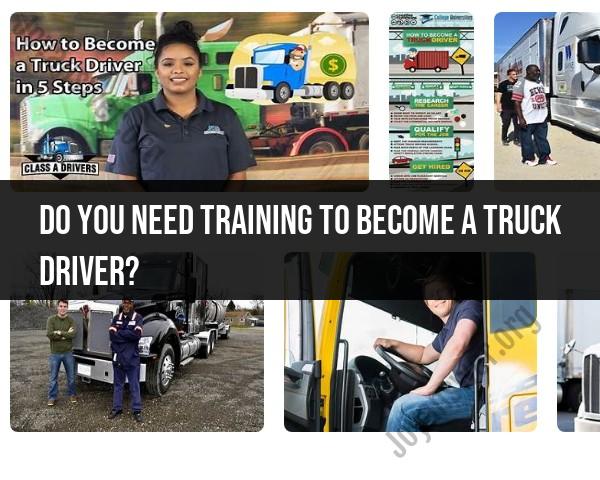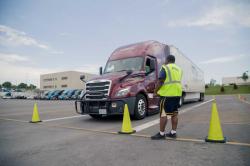Do you need training to become a truck driver?
Yes, training is typically required to become a truck driver. To legally operate a commercial motor vehicle (CMV) and obtain a Commercial Driver's License (CDL), individuals are required to undergo specific training to ensure they have the necessary knowledge and skills for safe and responsible driving. The specific requirements and training process can vary by country and region, but here is a general overview of the steps involved in becoming a truck driver:
Meet Eligibility Requirements:
- Be at least 18 years old (21 for interstate driving in the United States).
- Hold a valid driver's license issued by the state or country of residence.
- Meet any additional eligibility requirements set by the local transportation authority.
Educational Requirements:
- While a high school diploma or equivalent is not always required, having a basic level of education is beneficial for understanding training materials and passing exams.
Obtain a Commercial Learner's Permit (CLP):
- Before getting a CDL, individuals typically need to obtain a Commercial Learner's Permit (CLP). To do this, they must pass written knowledge tests covering topics such as general knowledge, air brakes, and combination vehicles.
Enroll in a Truck Driving School:
- Many individuals choose to enroll in a truck driving school to receive formal training. Truck driving schools provide both classroom instruction and hands-on training behind the wheel. Some schools offer financial aid options or are eligible for veterans' benefits.
Complete CDL Training:
- Truck driving school programs cover essential topics such as vehicle inspection, safe driving practices, and federal regulations. Students gain practical experience through supervised driving on the road and in various driving conditions.
Pass CDL Skills Tests:
- After completing training, individuals must pass a skills test to demonstrate their ability to operate a commercial vehicle. The skills test typically includes a pre-trip inspection, basic vehicle control, and an on-road driving test.
Receive a CDL:
- Upon successfully passing the skills test, individuals receive their Commercial Driver's License. The CDL is categorized based on the type of vehicle and endorsements for specific skills, such as hazardous materials or passenger transport.
Employment:
- With a CDL in hand, individuals can seek employment as a truck driver. Some may choose to work for trucking companies, while others may pursue owner-operator opportunities.
Continued Professional Development:
- Truck drivers are often required to participate in ongoing training and professional development. This may include safety training, compliance updates, and other industry-specific education.
It's important to note that the specific requirements and training process can vary by jurisdiction. Additionally, some individuals may choose to pursue advanced certifications or endorsements for specialized types of driving, such as transporting hazardous materials or driving oversized vehicles. Always check with the local transportation authority for the most accurate and up-to-date information on requirements and training for becoming a truck driver in a specific region.
Is formal training a prerequisite for pursuing a career as a truck driver?
Is Formal Training a Prerequisite for a Career in Truck Driving?
While not always strictly required, formal training is highly recommended and often serves as a de facto prerequisite for pursuing a career as a truck driver in most cases. Here's a breakdown of why:
Advantages of Formal Training:
- Obtaining a Commercial Driver's License (CDL): This essential license mandates passing theoretical and practical tests, which accredited truck driving schools are well-equipped to prepare you for.
- Developing Essential Skills: Schools provide comprehensive training in safe driving practices, maneuvering large vehicles, handling emergencies, adhering to regulations, and navigating different road conditions.
- Job Market Advantage: Many trucking companies prefer hiring graduates from reputable schools due to their proven skills and knowledge, giving you a competitive edge.
- Networking Opportunities: Schools connect you with instructors, industry professionals, and potential employers, opening doors to job opportunities and career guidance.
Alternative Pathways (with Limitations):
- On-the-job training: Some trucking companies offer in-house training programs, but these may not be as comprehensive as formal schooling and could limit your initial job options.
- Independent learning: While dedicated individuals can study CDL materials and attempt the tests without formal training, the success rate is lower, and the learning curve can be steeper.
Overall:
While technically, formal training isn't always mandatory, the vast majority of truck drivers obtain their CDLs and foundational skills through accredited schools. The advantages in terms of preparation, job prospects, and safety far outweigh the downsides, making formal training the preferred and recommended path for most aspiring truck drivers.
Remember, your safety and the safety of others on the road are paramount. Investing in proper training equips you with the knowledge and skills to navigate the complexities of truck driving with confidence and competence.
I hope this clarifies the importance of formal training for aspiring truck drivers! Feel free to ask if you have any further questions about specific training programs or the truck driving industry.




